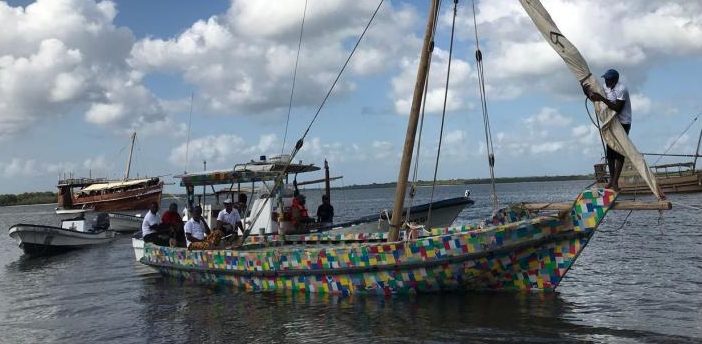The ‘FlipFlopi’ boat, is a 9-metre-long dhow, voyaging south along East Africa’s coast to raise awareness of the challenges plastics pose to the ocean, chief boat-builder and captain Ali Skanda stated. The marine ecosystem and the ocean has been crucially affected by the plastic debris and the boat aims to alert and wake up the locals on how they handle and dispose the waste.
The Flipflopi, built from 10 tonnes of plastic waste, was first launched in late 2018.
According to Reuters the boat sailed from Lamu island in Kenya to Zanzibar in Tanzania over two weeks starting on January 23.
As chief boat-builder and captain Ali Skanda reported
That’s why we started this voyage – to reach out to communities in East Africa, and also globally.
Through its voyage, the FlipFlopi made six stops, as its crew was joining schools, locals and officials to inform them on beach-cleaning, whereas also highlighting the plastic pollution in the oceans.
The motivation in constructing the boat, came from boat-builder and fisherman Hassan Mohammed who noted that hew has seen many changes in the recent decades.
Until 20 years ago, the shore at Mtwapa was free of pollution. But tourism has meant increased use of plastic carrier bags and bottles, which has harmed the ocean.
In the past, the ones fishing were only fishermen that protected the oceans by using woven baskets and not plastics. Today he stated that many are those that have started local businesses and contribute to the increase of plastic.
According to researchers’ estimations from UN Environment, there have been up to 8.3 billion tonnes of plastic produced, in a global scale, since the early 1950s.
From all plastic, only the 9% has been recycled, the 12% was incinerated and the rest lays in dumps, landfill or loose in the environment.
Moreover, teaming up with the Flipflopi-Clean Seas campaign, the Mombasa County government promised to help with the marine debris in its beaches, by closing its biggest dump, Kibarani, and altering it into a natural space by planning trees.
In addition, Co-founder Ben Morison highlighted that the Kibarani dumb is just a barrier and it’s not the solution to the biggest problem, as Mombasa needs $20 million each financial year to efficiently manage its waste.
Africa’s solid waste, which is for the time being in 125 million tonnes per year, is expected to double by 2025 because of alters in habits and the urbanisation, Juliette Biao Koudenoukpo, the director of UN Environment’s Africa office addressed.
We are struggling in Africa because waste management isn’t our priority. Waste is a threat to biodiversity, (but) it’s possible to transform this threat into opportunity – we can recycle and create jobs.
Furthermore, Joyce Gachugi-Waweru, country manager at PETCO, Kenya’s national industry body for plastic recycling, reported that the recycling industry could provide jobs for young people, generate wealth and safeguard the environment
The Flipflopi arrived in Stone Town, Zanzibar, on Feb. 7, eliciting pledges in its ports of call by 29 establishments, including 22 hotels, to minimise their plastic waste.
The voyage itself, and innovative spirit behind it, are symbolic of what we can do to make a difference.
…Seif Ali Iddi, second vice-president of Zanzibar said in a statement.

































































